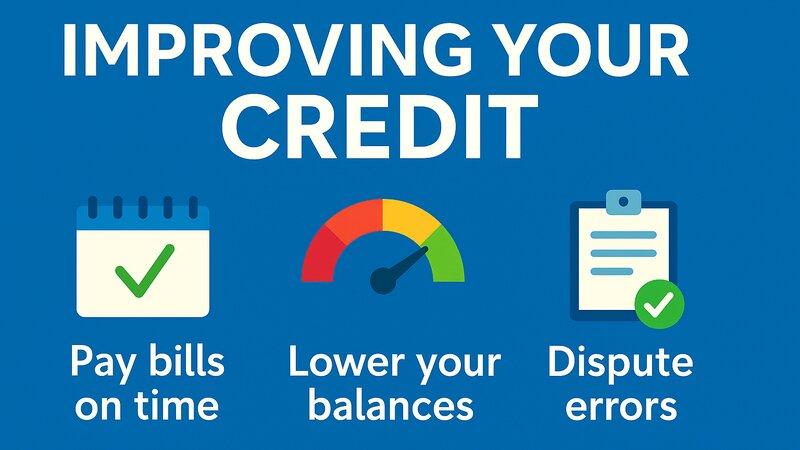- Apply Now
- Find a Car InventoryPriceMakes
- Learn More
- Customer Corner
- Service Dept.
- Rentals
by Sammy Hinson - Posted 7 months ago

Your credit score is more than just a number — it’s a gateway to financial opportunities or a roadblock that holds you back. Whether you're trying to buy a car, get approved for a home loan, rent an apartment, or even secure better insurance rates, good credit can make life easier. If you're struggling with bad credit, no credit, or simply want to improve your current score, you're not alone.
In this post, we’ll break down the Federal Trade Commission’s (FTC) practical guidance on how to improve your credit in a way that’s simple, honest, and effective.
For full FTC details, read the original guide here:
Improving Your Credit – FTC Guide
Before you can fix or build your credit, it’s important to understand what influences your credit score. While each scoring model (like FICO or VantageScore) has unique criteria, these are the common elements:
Payment history – Do you pay your bills on time?
Amounts owed – How much debt do you have, and how close are your balances to the limits?
Length of credit history – The longer your accounts have been open, the better.
New credit inquiries – Too many new applications can hurt your score.
Credit mix – A variety of loans (credit cards, car loans, etc.) helps.
Each of these plays a role in determining your score. Now, let’s explore what you can do to improve them.
This is the #1 rule of credit building and repair. Payment history makes up the largest portion of your credit score. Even one late payment can hurt you.
Set up automatic payments or calendar reminders.
Contact lenders if you're struggling — some offer hardship plans.
Keep track of due dates and avoid waiting until the last minute.
Even if you can’t pay the full amount, paying something on time is better than missing the due date completely.
If you’re behind on any bills, the sooner you get current, the better. Payment history gets better the longer you maintain on-time payments moving forward.
Make a list of past due accounts and reach out to your lenders.
Ask about repayment options or programs that could remove late fees.
Avoid skipping or ignoring notices — staying proactive matters.
Even if you’re making minimum payments, having high balances can drag down your score. Your credit utilization ratio — how much you owe vs. your total credit limits — should stay below 30% for best results.
Pay more than the minimum each month.
Stop using cards until balances are reduced.
Consider consolidating debt with a lower-interest personal loan.
Request a credit limit increase — but only if you can manage it responsibly.
Reducing debt helps your credit and your monthly budget.
When you apply for new credit, the lender pulls your credit report — known as a hard inquiry. Too many of these in a short time can negatively affect your score.
You’re establishing credit for the first time (with a secured card, for example).
You’ve built a better score and want to access better rates or terms.
You’re diversifying your credit mix carefully.
Avoid applying just to “see if you’ll get approved.” That uncertainty isn’t worth the impact on your report.
For people with no credit or very low credit, a secured credit card can be a smart way to get started. It requires a deposit (usually $200–$500) that acts as your credit line.
Builds credit history safely
Reports to major credit bureaus
Helps develop healthy spending habits
Choose a secured card with no hidden fees and a clear path to graduation to a regular card.
You can’t fix what you can’t see. Checking your credit reports regularly helps you stay on top of errors, fraud, and progress.
Use AnnualCreditReport.com — the only official free site for your reports.
You’re entitled to one free report per bureau, per year — that’s three total.
During special times (such as the pandemic), free weekly reports have been available.
Look for:
Accounts you don’t recognize
Incorrect balances or payment statuses
Outdated personal information
If you find a mistake, take action. Reporting errors to the credit bureaus can help restore your credit standing if they’re affecting your score.
Contact the credit bureau (Equifax, Experian, or TransUnion) directly.
File a dispute online or by mail with supporting documentation.
Contact the company that reported the error (such as a credit card company).
Keep copies of all communications.
Most disputes must be resolved within 30 days.
If someone promises to “erase your bad credit instantly,” it’s probably a scam. Some companies offer legitimate help — but many just take your money and make empty promises.
Upfront fees before any work is done
“Guaranteed” results or score increases
Advice to lie or create a new identity
Refusal to tell you your legal rights
Instead, use trusted resources like non-profit credit counselors or the FTC’s guidance.
Sometimes, we all need help. Non-profit credit counseling agencies can guide you through budgeting, repayment plans, and improving your credit.
One-on-one budgeting help
Debt management plans (DMPs)
Negotiation with creditors
Educational resources
Check the National Foundation for Credit Counseling (NFCC.org) or Financial Counseling Association of America (FCAA.org) for accredited agencies.
Don’t close old accounts unless there’s a good reason — long-standing credit helps your score.
Keep credit use consistent — avoid big swings.
Use rent and utility reporting tools to build your score from everyday payments.
Improving your credit isn’t about tricks — it’s about smart, consistent habits. Pay on time. Keep balances low. Fix errors. Stay patient.
If you’re struggling with bad credit, no credit, or want to get on the right financial track, you’re not alone. Thousands of people are doing the same — and it starts with steps like the ones above.
For more details, visit the official FTC guide here:
https://consumer.gov/credit/improving-your-credit